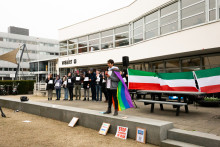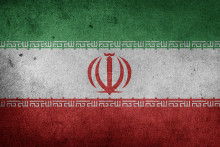She is eager to talk. About what the 'revolution' in Iran means to her, about how she occasionally has some contact with family members via a VPN connection. And where the huge protests come from and where they can lead. But the 32-year-old UT researcher wants to do so anonymously. 'It takes a lot of bravery as an Iranian to tell what is happening in our country now, but it would be very dangerous to do so under my own name, especially for my family.'
First back to Tuesday, September 13. Religious morality police arrested 22-year-old Mahsa Amini in capital Tehran. The protocols of the Islamic government didn't accept her hijab. Eyewitnesses saw her being beaten by officers after her arrest. She died after being in a coma for three days. Police maintained it was an unfortunate incident and spoke of a heart attack.
The drop
Her death resulted in a series of large-scale protests in the country and far beyond. The United Nations spoke out, as did international celebrities. In protest, women took off their hijabs and cut their hair. 'Actually, I am not surprised by the protests. This discontent with the patriarchy – the social system in Iran in which the dominant and privileged positions are held by men – has been lurking for a long time. Since 2019, protests have been growing. The death of Mahsa Amini was the last straw,' says the UT researcher.
To restore calm in the country, the government of the islamic republic largely shut down the internet. For the UT researcher, this had the effect of cutting off the online connection between Enschede and her hometown. 'Very occasionally I get through briefly with a VPN connection. I try everything, including with providers, but the situation is very difficult.'
What also does not help her is that she can find little support from the Iranian community in Enschede and its surroundings. 'That might be hard to understand in the Netherlands, but as unknown Iranians, you can't trust each other just like that. You don't know how another thinks about the system and it is dangerous to speak out, especially as a woman. You have to be very careful with that.'
Professors
The researcher is shocked by the images showing protests being brutally crushed. At the same time, she hopes these weeks could become a turning point in the country's history. 'The protests are not just about freedom, equality or women's rights. It is a call for a totally different system and that freedom must be fought for.' What, in her view, can make a difference in Iran? 'If rich and important people go on strike. Fortunately, in several places you already see professors, for example, laying down their work. That can make a difference.'
In Enschede, the researcher is trying to connect with her family as much as possible for now. On Saturday – when people worldwide take to the streets for the situation in Iran – she is likely to attend a national freedom rally in Ter Aar. 'Hopefully all this will bring about something beautiful in Iran.'





